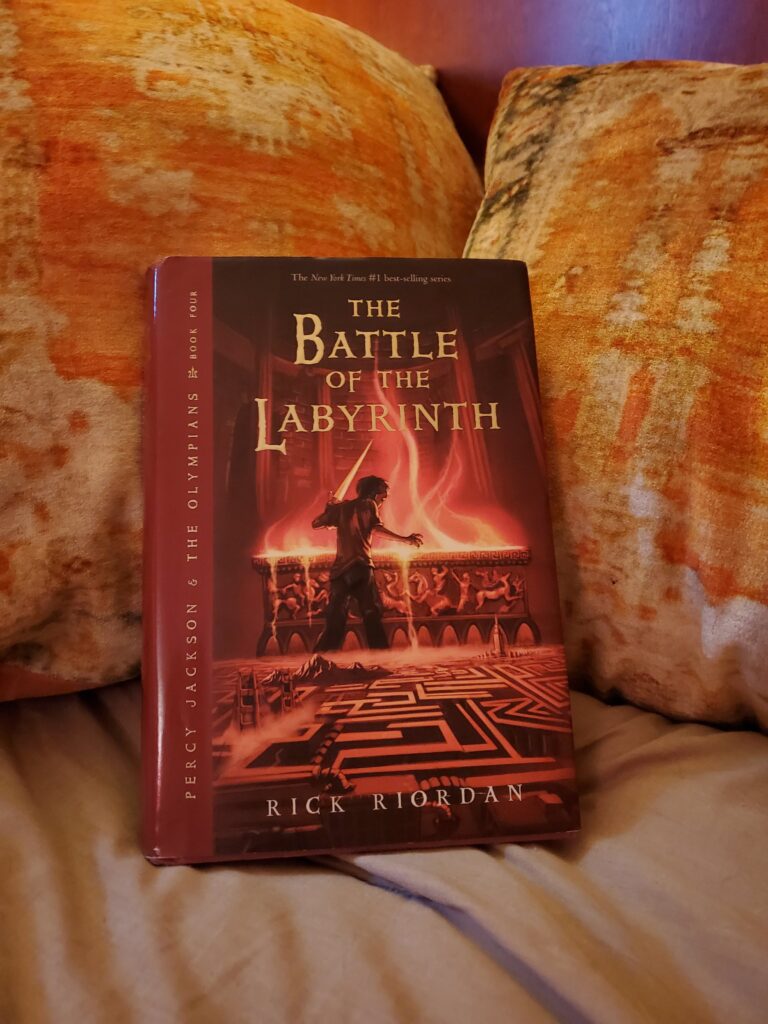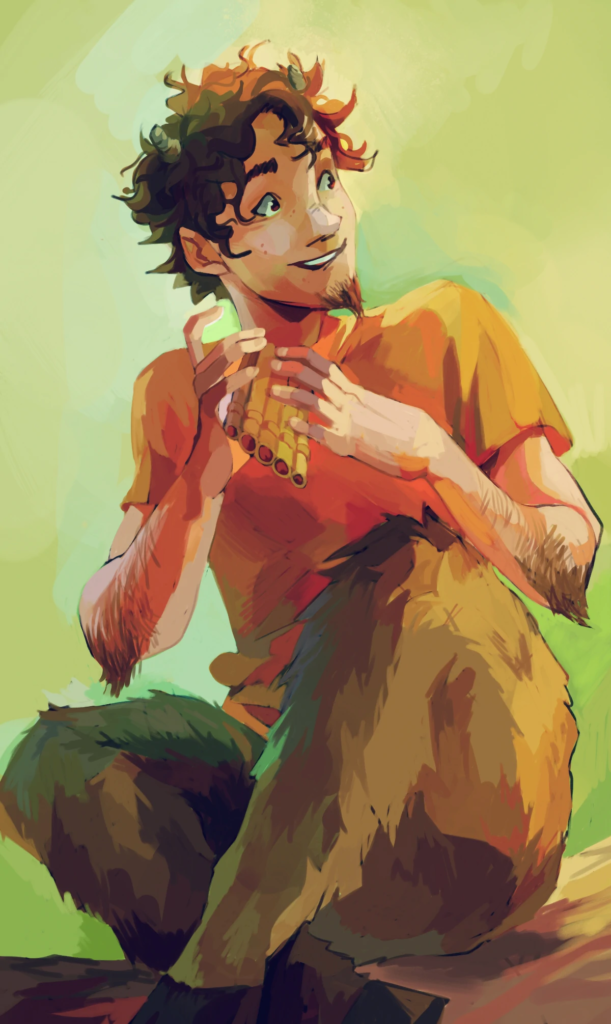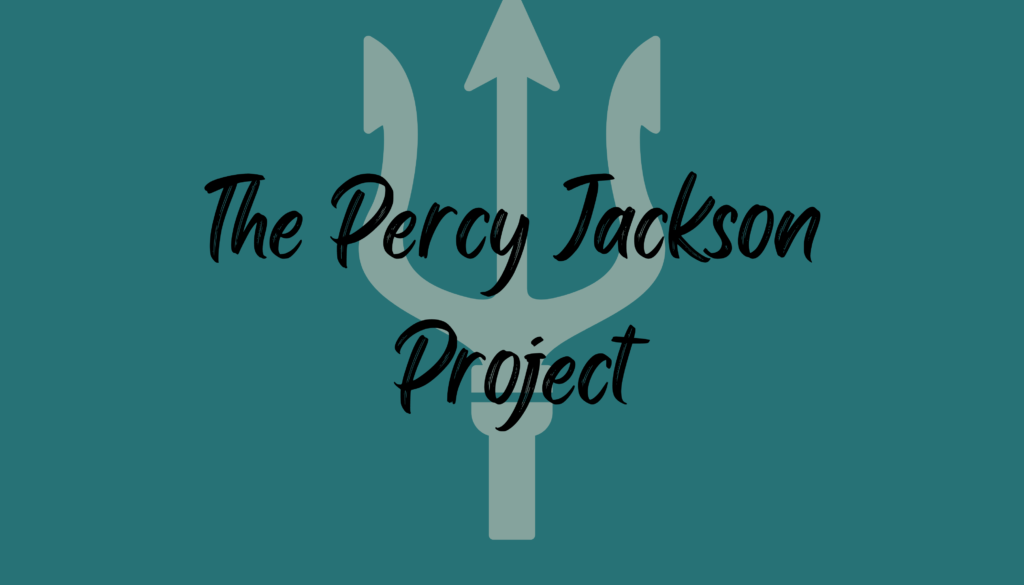Percy Jackson Project: The Battle of the Labyrinth
Welcome back to the Percy Jackson Project! A reminder that this is a SPOILER HEAVY series of posts about my read through of the Percy Jackson series, so if you are not familiar with Percy Jackson and the Olympians through The Battle of the Labyrinth and you read this post any spoilers you read are your own fault. Now! It has been a while, but that is mostly because I took a break for the holidays and got distracted by reading other books (I have read over 100 books this year! Check me out on storygraph and goodreads.) But now I am back on track and ready to talk to you all about the journey Percy took through the Labyrinth. I know, I know, I promised at the end of my last post to write about Annabeth’s role in the Titan’s Curse but honestly my heart was not in it! But you will get some Annabeth discussion in this post and it will touch on things that happened in Titan’s Curse, so hopefully that will satisfy you.

I have to say, the wildest thing about this project so far is that I know that I read the Percy Jackson books before. While reading The Battle of the Labyrinth I came across a scene that was so eerily familiar I know I must have read it before because as I consumed it, I actively remembered each moment with crystal clarity. That said, aside from this one scene, the rest of the book, with all its twists and turns, was wholly unfamiliar to me, with characters appearing that I could swear I had never heard of, and plot twists that caught me entirely by surprise.
One character I was surprised to see turn up again was Rachel Elizabeth Dare. I am not certain why I was surprised, because she was clearly set up in the last book to become much more important that she would have been if she were only in that one scene. I have also seen her mentioned several times on Tumblr, so I do not know why I did not expect her to be in this book.
I was embarrassed at how shocked I was when I found out that Quintus was Daedalus. I honestly had no idea and never would have guessed it right up until he revealed the truth, which is potentially foolish of me, since given the clues dropped earlier, I think other people probably guessed long before I found out.
The Battle of the Labyrinth is a book that simply feels different from all the other Percy Jackson books that I have read so far. There are heightened stakes, and Percy’s entire world feels like it has grown and established itself as an increasingly dexterous realm. Perhaps it is because I am getting deeper into the series and more entrenched in its lore, but I am finding myself much more invested in the characters and what Riordan can do in terms of exploring their arcs.
I am fascinated by where this series is taking Annabeth. As I mentioned before I have been meaning to discuss her arc for a while now, and I think that talking about Annabeth is a challenge, but also more interesting for the fact that we see Annabeth entirely through the lens of Percy, and we must interpret her actions and their implications through him. This is difficult, because as we see throughout the series, Percy does not always have the best grasp of Annabeth and her emotional and mental state, despite being her best friend, and so it can be difficult to interpret what is going on with her both because he struggles to understand her and because she intentionally conceals things from him.
One thing that is clear to us (primarily because it is clear to Percy) is how hurt Annabeth is by Luke’s actions and Luke’s connection to Kronos. The fact that her close friend is working for and has now been possessed by the Titan is something that she finds hard to bear. Percy, who does not have as close of a connection with Luke, struggles to empathize fully with Annabeth and finds it somewhat easier to compartmentalize and categorize Luke as being evil, but Annabeth is not able to do so as easily. To a certain extent Percy is not able to do this either — we see this when Percy hesitates to kill Kronos/Luke before understanding the depths of the possession towards the end of The Battle of the Labyrinth — but he is eventually able to give up on Luke, where Annabeth seemingly is not able to do so quite as well.
We see Annabeth entirely through the lens of Percy, and we must interpret her actions and their implications through him.
Annabeth’s struggles with her family are something foreign to Percy. He does not understand her or her family dynamic for a long time, and this causes a lot of strife for them as she hides a lot of the trauma that was caused, and he unknowingly stumbles into some of her triggers. Throughout the books we learn about Annabeth’s family piecemeal, and in The Battle of the Labyrinth we learn some new information that completely threw me off — Annabeth’s casual assertion that all children of Athena are born out of thoughts rather than the result of sex. I was confused, and more than slightly dismayed when reading this. While the idea of Athena’s children being born out of thoughts is interesting and has potential, reading about it raised a few issues for me.
The first is that it reminded me of the double standard. All the prominent children of gods that we see are the children of gods with the only goddesses being Aphrodite and Athena, and at later point Eris. The child of Eris is an antagonist, and the daughters of Aphrodite are flighty, the primary characterization of their mother being her promiscuity. Athena was the exception, the one goddess who I was under the impression broke the mold — except that is also odd because Athena is a virgin goddess. At first, I was thrilled because I thought Riordan was eschewing this and going with the idea that the word virgin related to marriage only, and that Athena had dalliances with human mortals just as much as her fellow gods did. Doing so regarding Athena would have been strange — unlike Artemis, who as a virgin goddess can be arguably queered as a lesbian, Athena is clearly queered as asexual.
Continuing to my second point, Riordan’s solution to the issue makes me uneasy because the fact that these children are a “gift” to the men that Athena favors also sets up negative implications regarding the agency of fathers in terms of having kids and issues of consent. This in fact could be a large part of what leads to the awkwardness of Annabeth’s relationship with her father and the resentment that her stepmother feels towards her, especially if we consider whether her stepmother might have been in a relationship with her father and her father thought that he was in a non-sexual friendship with Athena that could never result in children. That is my pet theory anyway and would make a great fanfiction. A better alternative to all of this on Athena’s part would be a scenario in which she has conversations with partners about whether they want children grounded in consent.
Returning to Annabeth, I think that by the time we as readers reach The Battle of the Labyrinth, we have learned much more about her than we had on hand in book one, and I have grown to love her even more as a character than I did then. In The Titan’s Curse we saw much of her strength — she literally held up the world, something that she did for Luke, despite how he had betrayed them, which says a great deal about her character and her penchant for loyalty. She makes the decision to not join the Hunters, though I am not certain that she ever seriously entertained it or whether it was simply a red herring on Percy’s part because of his fundamental inability to understand who Annabeth was as a person at that point.
I also think that she has shown a real capacity for growth, especially when one considers how she has grown to consider Tyson a friend, after their adventure in the Sea of Monsters. When she goes off on the Quest into the Labyrinth Chiron cautions her that she should not take three companions because a Quest of four is not traditional — the previous Quest of five left two dead. But Annabeth, Percy, Grover, and Tyson now share a bond over the course of their adventures, and Annabeth insists that she needs all of them with her. She is scared, and vulnerable, and it is a beautiful moment in the book.
Part of what has always struck me about the Percy Jackson series is how adult all the children within the series are. The children in these books are rarely, if ever, treated like kids, they are not coddled or held back from battles, there are no adults to protect them from the harsh realities of war — in fact, the adults of the series are constantly sending them on these Quests, throwing them into battle, or outright attacking the adolescents themselves.
The children in these books are rarely, if ever, treated like kids.
I find it distressing that these children are fighting these battles consistently instead of being able to enjoy a childhood without the threat of imminent death, but that’s not what kind of book series this is, so I get what I signed up for, I guess. Still, the fact that Nico just wanders around on his own, doing whatever he wants and undertaking his investigations with no one stopping him is wild to me. I know that kids can be incredibly self-sufficient, but the fact that they are not being cared for breaks my heart.
One thing I do appreciate is that given none of these adults seem to care about protecting these kids they at least respect them. Sometimes I find there are stories where kids are thrown into battle and adult roles, and then when they have saved the day, they are expected to return to a submissive child role and listen to the adults who make the big decisions. While the demigod children do submit to the gods and their instructor Chiron, they do so out of respect, but Percy and Annabeth and Grover also stand their ground and are respected for their choices. When Grover tells of the death of Pan, he is supported by Dionysus and Chiron against the older Satyrs who reject what Grover is trying to tell them.

On a note related to Grover, however, I still maintain that he is not exactly a child, because as the first book notes him as being 28, he is by my count at least 30 at this point in the series, and while Satyr years might be adjusted differently from human years I still think that lived experience counts for something even if hormonal maturity isn’t quite up to what it is for a 30 year old human, so I would say that he is more of an adult than the narrative would have us believe and while I don’t think that makes him any less Percy’s friend I do think that is something to perhaps note, in particular as we consider how his relationship to Juniper is much more advanced than Percy’s relationship to Annabeth, particularly because Juniper and Grover have much more lived experience than do Percy and Annabeth, even if they are all supposedly on the same developmental wavelength.
Thinking about these deep worldbuilding issues is something that has come up more and more as I have gotten deeper into the books — another one is an offhand comment that Chiron makes about how Harriet Tubman was a demigod. This made me realize that the fact that Riordan made so many famous figures in history demigods as part of building the world of Percy Jackson has some consequences that I am not sure the author could have predicted. In attributing all the accomplishments of people like Harriet Tubman to the godly parent, Riordan is taking away the agency and the strength it took for someone — a real person who faced what many would call insurmountable odds, danger, and saved lives in ways that fundamentally shape what our society has become — and attributed her efforts, a Black woman’s efforts, to a white, male power.
Doing so is a charged action, it is meaningful in a negative way, and it does have consequences in how it weakens her image. Placing historical references into a fantasy text is a good way to get people to investigate history for themselves sometimes. But it can also have the effect that for some kids reading, the first time they hear about Harriet Tubman and the Underground Railroad will not be about how she escaped slavery before voluntarily returning over a dozen times to free those others, or about how she served as a spy during the civil war. And that first memory is what might stick. I do not mean to split hairs, but to me it feels disrespectful to attribute her strength of will to anything but her own self and the other abolitionists and fellow slaves she had to support her.
Overall, I think that The Battle of the Labyrinth was a solid installment in the Percy Jackson series, and given the serious conversation that Percy and Nico were about to have at the end of the book I am intrigued as to what is going to happen in book five. So much has happened and there is so much chaos that I am not sure that everything could be resolved in one book, so it does not surprise me that there are more books in the demigods universe, but I do wonder what they will focus on.

The Percy Jackson Project Lives! Thoughts on "The Demigod Files" - Word-for-Sense and Other Stories
July 5, 2022 @ 08:00
[…] me. Since I’ve already reviewed The Lightning Thief, The Sea of Monsters, The Titan’s Curse, The Battle of the Labyrinth, and The Last Olympian, I’ll be starting next week with my thoughts on The Lost Hero, the first […]